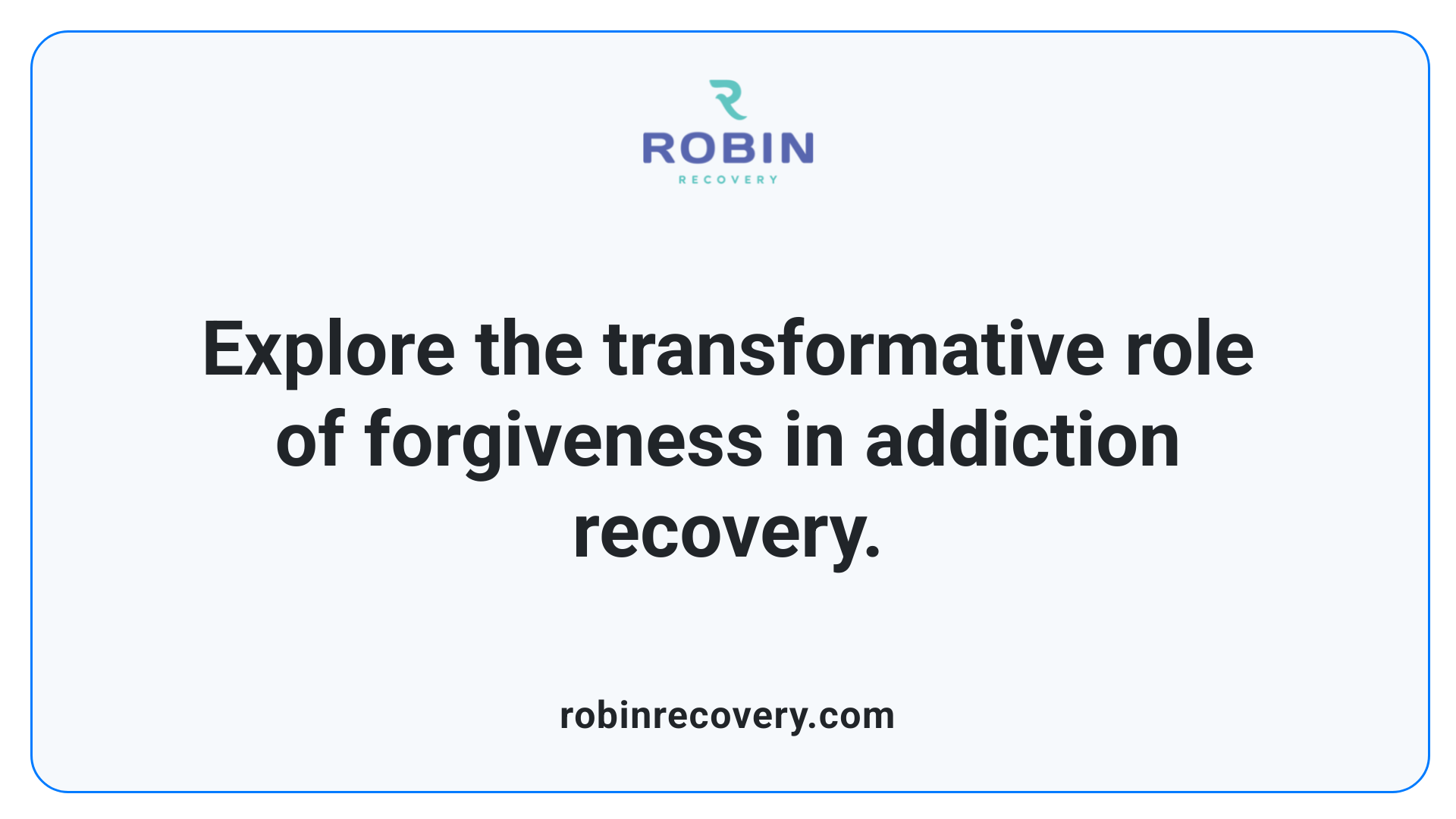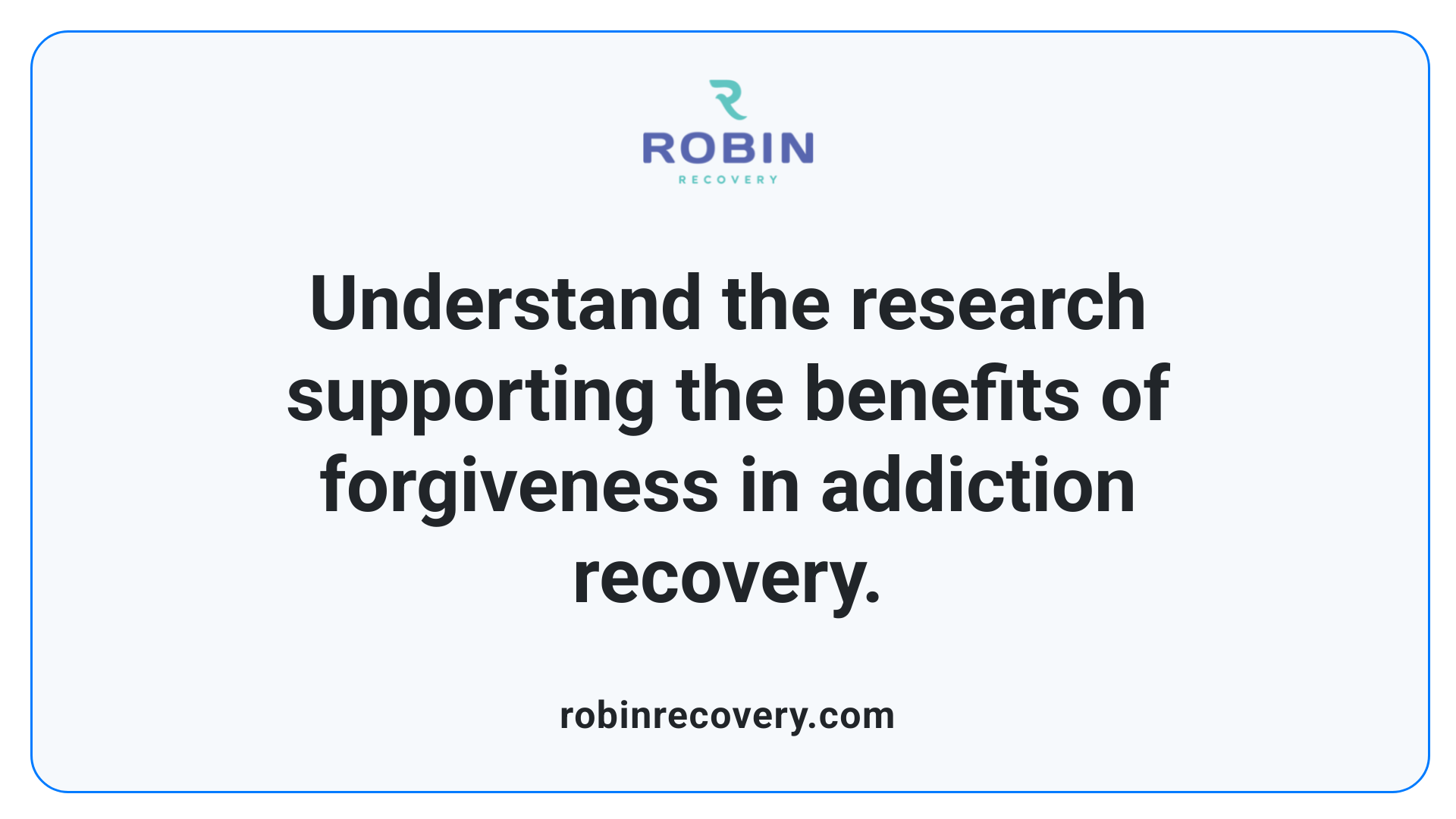The Role of Forgiveness in Family Therapy and Addiction Recovery

Introduction: The Healing Power of Forgiveness
The journey through addiction recovery is a complex and deeply personal one, significantly influenced by the ability to forgive. Forgiveness is not only a personal endeavor but also a pivotal component in family therapy, facilitating the healing of relationships strained or broken by addiction. This article will explore the multifaceted role of forgiveness in both individual and familial contexts within the recovery process, shedding light on its benefits for emotional healing, mental health, and the stabilization of family dynamics.
Forgiveness: A Crucial Element in Addiction Recovery

Why is forgiveness important in addiction recovery?
Forgiveness is vital in addiction recovery because it serves as a powerful tool for personal growth and healing. Self-forgiveness allows individuals to focus on the present and move past guilt associated with their past actions, which is essential for making positive changes.
The journey towards self-forgiveness often begins with acknowledging mistakes and taking responsibility for actions that caused harm. This step must be accompanied by practicing self-compassion, as treating oneself with kindness plays a significant role in the recovery process.
Additionally, making amends through apologies or repairing relationships contributes to one’s path toward forgiveness. This not only helps individuals cope with their past but also facilitates emotional healing, allowing them to release feelings of guilt and shame.
Embracing forgiveness ultimately enables individuals to let go of negative emotions, fostering a healthier mindset crucial for sustained recovery. It creates an environment filled with understanding rather than resentment, thereby solidifying the foundations needed for a successful recovery journey.
Benefits of forgiveness on personal growth and healing
The process of forgiveness enriches both personal growth and emotional healing. It alleviates stress and anxiety, which are common triggers for relapse. Studies affirm that practicing forgiveness fosters better mental health, reducing feelings of depression and resentment.
Through forgiveness, individuals enhance their self-esteem and emotional resilience, redirecting their energy toward healthier relationships. This shift can lead to significant improvements in overall well-being, which is crucial for fostering sustained sobriety. Furthermore, forgiveness opens the door for deeper connections and more meaningful interactions with loved ones, reinforcing a support system essential in the recovery process.
Letting go of guilt and self-forgiveness
Letting go of guilt is a transformative journey in addiction recovery. Self-forgiveness allows individuals to acknowledge their past actions without letting those ghosts define them. This process involves recognizing mistakes, accepting responsibility, and adopting healthy coping strategies to improve self-image.
Engaging in cognitive-behavioral therapy (CBT) can help individuals reframe negative thoughts and nurture a healthier perspective. By releasing self-judgment, those in recovery can break free from the chains of guilt and shame that often hinder progress. In this newfound clarity, individuals can focus on personal renewal, ultimately propelling them towards a successful recovery.
The Interconnected Benefits: Forgiveness, Self-Esteem, and Mental Health

What is the relationship between forgiveness, self-esteem, and overall mental health in recovery?
The relationship between forgiveness, self-esteem, and overall mental health in recovery is intricately connected through their interactive effects. Participants in recovery often show higher levels of self-forgiveness and forgiveness of others, which promote emotional healing and resilience.
As individuals practice forgiveness, they tend to experience improved self-esteem, which directly counters feelings of guilt and shame that frequently accompany addiction recovery. Enhanced self-esteem plays a vital role in fostering a positive self-image, leading to more effective coping strategies and emotional stability.
Research highlights that forgiveness not only aids in emotional relief but also significantly boosts mental health outcomes, ultimately supporting individuals in their journey towards sobriety. Through forgiving themselves and others, individuals can let go of resentment and negative emotions, facilitating a healthier mindset essential for avoiding relapse.
By addressing both self-esteem and mental health, the act of forgiveness becomes a critical component of a holistic recovery approach, reinforcing a continuous cycle of growth and healing.
ForgivenessSelf-EsteemMental Health Promotes emotional healing Improves self-image Reduces anxiety and stress Increases resilience Supports emotional stability Enhances coping strategies Mitigates guilt and shame Fosters positive relationships Lowers risk of relapse Facilitates healthy coping Sustains long-term recovery Encourages personal growth
Forgiveness is, therefore, a cornerstone in addiction recovery, interlinking self-esteem and mental health for lasting change.
Integrating Forgiveness into Therapeutic Practices

What therapeutic approaches integrate forgiveness in addiction recovery processes?
Therapeutic approaches that integrate forgiveness into addiction recovery are essential for healing emotional wounds. Self-forgiveness interventions play a critical role in addressing the guilt and shame that often accompany addiction, helping individuals pave a path towards recovery.
Programs like Twelve Step Facilitation Therapy emphasize the significance of letting go of resentments, fostering emotional healing as part of the recovery process. This approach aligns well with the principles of Motivational Interviewing, guiding individuals to confront their past while encouraging self-acceptance and responsibility.
Additionally, structured models of forgiveness therapy, such as the Enright Model and the REACH Model, effectively assist clients in navigating the complexities of forgiving themselves and others. These models provide a roadmap for individuals to address their feelings and work through the forgiveness process.
Moreover, cultivating gratitude in tandem with forgiveness can lead to improved psychological health and resilience. It contributes to more positive recovery outcomes by redirecting focus from past grievances to present opportunities.
In summary, integrating forgiveness into therapeutic practices is vital for managing emotional challenges in addiction recovery, fostering a supportive environment for personal growth.
Cultivating Forgiveness within Family Systems Affected by Addiction

What are some practical strategies for cultivating forgiveness within families affected by addiction?
Cultivating forgiveness within families facing addiction requires intentional efforts and clear strategies. Here are several practical approaches:
- Educate Yourself About Addiction
Understanding addiction as a disease can transform perspectives. This knowledge fosters empathy and compassion, allowing family members to appreciate the struggles faced by their loved ones. - Engage in Active Listening
Listening without judgment provides space for open communication. It enables family members to connect with and validate each other’s feelings about the addiction and its impacts. - Set Healthy Boundaries
Maintaining boundaries is essential for protecting individual mental health while navigating the complexities of forgiveness. Family members are encouraged to establish limits that promote safety and respect. - Utilize Structured Forgiveness Models
Models such as the REACH Model or the Enright Model help individuals process their emotions systematically. These frameworks guide families through acknowledging pain, extending forgiveness, and fostering healing. - Practice Individual Growth
Engaging in personal practices like journaling feelings or seeking therapy enhances the forgiveness experience. Therapy can reinforce personal development, support recovery, and facilitate family dynamics.
What is the impact of forgiveness on family relationships?
The impact of forgiveness on family relationships is profound and multifaceted. Notably, it can:
- Alleviate Stress
Forgiveness reduces negative emotions such as resentment and anger, which can relieve familial tension and promote a healthier environment for recovery. - Enhance Emotional Health
Families that work through forgiveness often experience improved trust and understanding, allowing relationships to deepen, which is crucial for supporting recovery. - Improve Communication
Openness about past hurt encourages dialogue, facilitating expression and acknowledgment of feelings, which can lead to more meaningful connections. - Promote Lasting Change
As family members move toward forgiveness, they are more likely to build resilient relationships, helping to prevent future conflicts related to the addiction.
By fostering forgiveness through these strategies, families create a supportive environment essential for the recovery process.
The Impact of Forgiveness on Therapy and Family Dynamics
How does forgiveness impact therapy and family dynamics during recovery?
Forgiveness plays a significant role in therapy and family dynamics during addiction recovery, fostering emotional healing and enhancing relational trust among family members. By choosing to forgive, individuals can process their pain and anger, aiding in self-awareness and overall mental health.
Studies, like those from the Stanford Forgiveness Project, demonstrate that practicing forgiveness can reduce stress and enhance resilience, benefiting recovery. Family therapy approaches, such as the Forgiveness-Reconciliation Model, delineate structured stages that guide clients through their emotions. These stages address acknowledgment of pain, expression of feelings, and granting forgiveness, leading to healthier relationships.
It is crucial for therapists to support clients in their unique journeys without pressuring them into forgiveness. Authentic healing often requires acceptance of feelings and experiences. Acknowledging hurt and fostering an environment of open communication enables family members to rebuild trust and connection, essential components for successful recovery.
Additionally, therapeutic interventions, including cognitive behavioral therapy (CBT), enhance the forgiveness process, helping individuals address their negative thought patterns surrounding self-worth. Practicing forgiveness not only alleviates relational stress but also nurtures compassion, leading to deeper connections and improved emotional health within families.
Research-Backed Benefits: Forgiveness in Enhancing Recovery Outcomes

What research findings support the effects of forgiveness in enhancing recovery outcomes?
Research findings provide compelling evidence about the significant impact of forgiveness on recovery from addiction. It reveals that both self-forgiveness and the act of forgiving others contribute to improved mental and physical health outcomes for individuals in recovery.
Studies indicate that as individuals enhance their levels of forgiveness, they experience reductions in symptoms of depression, anxiety, and stress. These improvements are critical, as such mental health factors often play a pivotal role in successful recovery.
One notable finding is the effectiveness of forgiveness therapy, which has shown to lead to marked enhancements in overall well-being. Participants engaging in forgiveness training reported feeling less emotional hurt and experienced lower stress levels compared to those not participating in such interventions. This therapeutic approach actively promotes emotional clarity and facilitates healthier coping strategies, essential for the recovery journey.
Moreover, fostering an environment that encourages forgiveness not only aids individuals in their personal healing but also enhances their motivation for treatment. Improved relationships, as a result of forgiveness, further strengthen the support systems crucial for maintaining sobriety.
In summary, research substantiates that placing emphasis on forgiveness can yield significant benefits, promoting positive outcomes in addiction treatment and supporting individuals in their journey toward recovery.
Conclusion: Forgiveness as a Catalyst for Healing and Growth
As explored throughout this narrative, forgiveness is an integral aspect of addiction recovery and family therapy, offering pathways to healing and growth for individuals and their loved ones. By embracing forgiveness, recovering individuals can overcome feelings of guilt and resentment, fostering greater emotional resilience and improved mental health. Additionally, families touched by addiction can benefit profoundly from forgiveness, leading to healthier dynamics and strengthened relationships. With the support of structured therapy programs that emphasize forgiveness, the path to recovery can become one of empowerment, understanding, and lasting transformation, underscoring the vital role forgiveness plays in healing fractured lives and relationships.
References
- The Role of Forgiveness in Addiction Recovery - The Differents
- From Resentment to Forgiveness in Family Therapy - FHE Health
- The Role of Forgiveness in Addiction Recovery
- The Importance of Forgiveness in Recovery | Addiction Rehab
- Forgiveness and Cohesion in Familial Perceptions of Alcohol Misuse
- What Role Does Forgiveness Play in Addiction Recovery?
- The Role of Forgiveness in Addiction Recovery
- The Impact of Self-Forgiveness and Forgiving Others in Recovery
- What Role Does Forgiveness Play in Addiction Recovery?
- The Transformative Power of Forgiveness in Recovery
